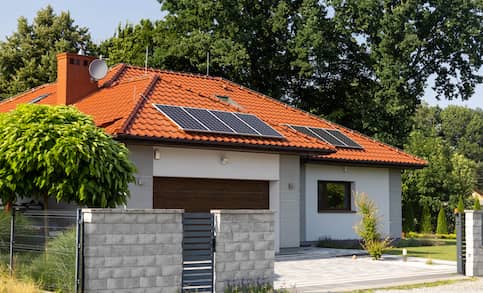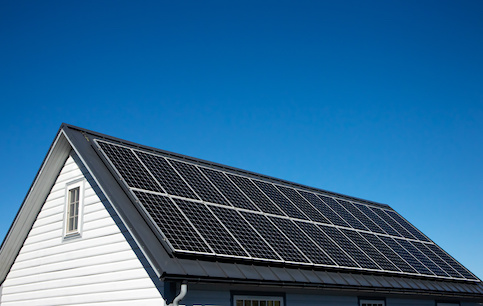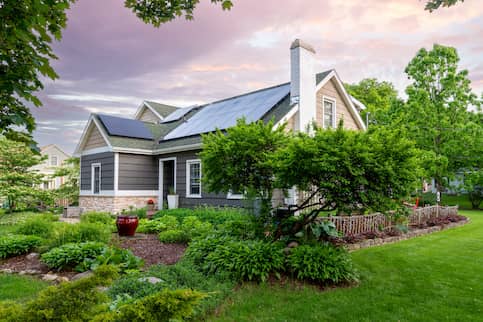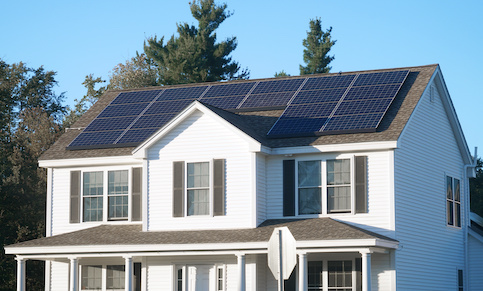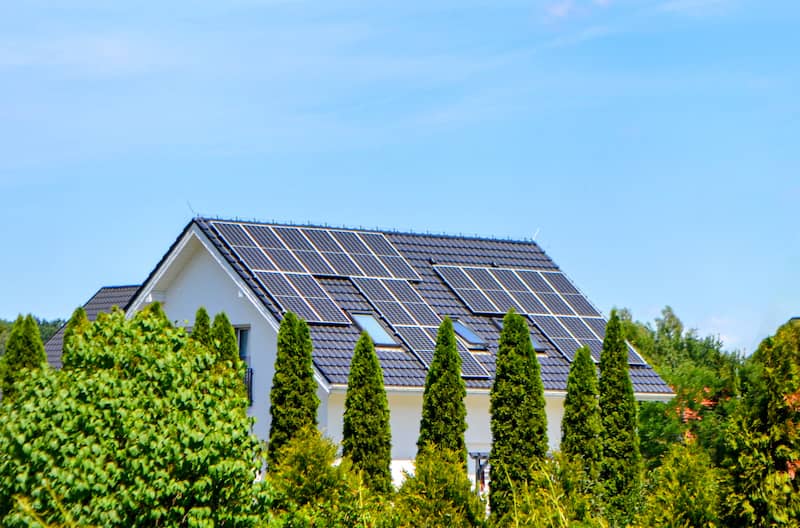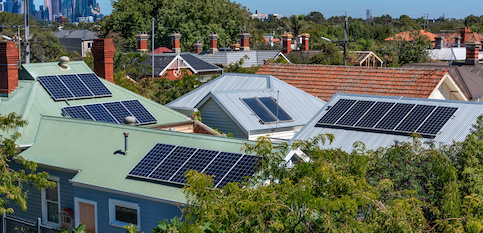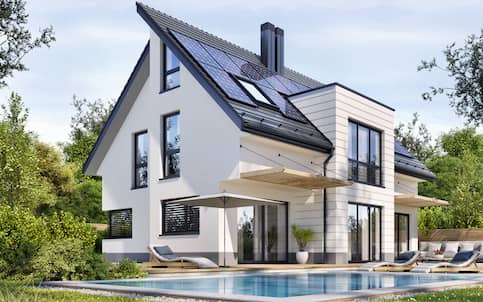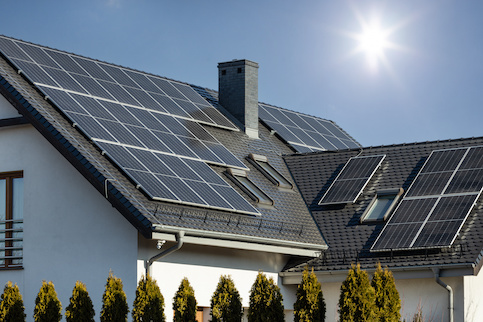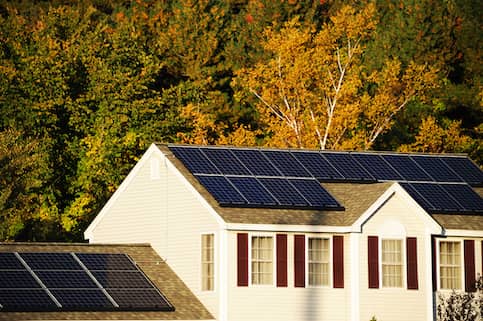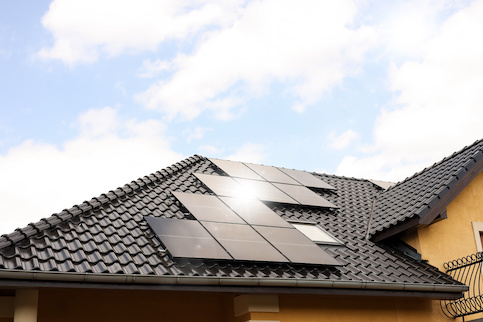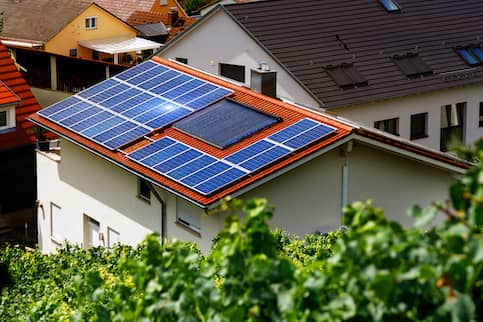The 2023 Guide To Finding Cheap Solar Panels
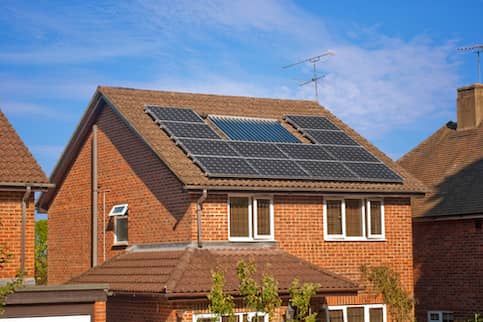
There are some advantages of buying solar panels, including reducing your electric bills (and your carbon footprint), improving home value and energy independence from the grid. However, solar panels can be expensive, and it’s natural to consider how you might be able to purchase cheap solar panels.
Let’s walk through how you can enjoy the benefits of this source of renewable energy while reducing your costs by using the following tips.
Find A Mortgage Today and Lock In Your Rate!
Get matched with a lender that will work for your financial situation.
How To Get Affordable Solar Panels
What’s the average cost of installing solar panels? They typically cost $16,000 on average, or between $3,500 – $35,000, depending on the model and type. The factors that will affect your final bill include the materials used in your solar panels, installation costs, solar panel company, the tax credit you receive, location and more.
Use the following recommendations to help them find the most affordable solar panel option.
Research Multiple Types Of Panels And Manufacturers
The first step involves researching common types of photovoltaic residential solar panels, including polycrystalline, monocrystalline and thin-film solar panels.
- Polycrystalline: Polycrystalline solar panels have blue-colored cells that consist of multiple silicon crystals melded together. They are a bit less efficient compared to other types of solar panels but affordable. They cost $0.91 – $1 per wattage for average installation. They typically have an energy-efficiency rating of 15% – 17%.
- Monocrystalline: Monocrystalline modules, made of pure silicon, contain a single silicon crystal made into cylindrical ingots. They typically cost $1 – $1.50 per watt on average to install. They typically have the highest energy efficiency compared to other types of panels.
- Thin-film: This type of flexible panel is usually used for off-grid applications and has a thin film of solar photovoltaic (PV) material on a substrate. The thin-film solar cells, which are thinner than human hair, fall into three types: amorphous silicon (A-Si), cadmium telluride (CdTe) and copper indium gallium selenide (CIGS). They typically cost $1 – $1.50 per watt on average to install. This technology is less efficient than the crystalline solar panel systems.
Different solar companies use a wide variety of pricing strategies. Compare multiple types of panels and several different manufacturers to help find affordable solar panels that best fits your budget, including pricing the inverter. An inverter converts direct current (DC) to alternating current (DC).
Collect Quotes From Several Installers
Next, collect installation quotes from a few installation companies. Certain factors could make certain installers less expensive than others, such as their overhead costs, the system’s design, quality of equipment used, warranties and other factors.
Compare Features And Benefits
Getting a low price is important but it’s a good idea to consider other factors when shopping for solar panels. Check the following before purchasing, including:
- Energy-efficiency: Energy efficiency refers to how well the efficiency of a photovoltaic (PV) cell converts energy shining on a PV device gets converted into usable electricity. The more efficient the solar panels, the more energy output and more savings you’ll incur as a homeowner.
- Wattage: Wattage refers to the amount of solar power a panel creates. The higher the wattage rating, the more power your solar installation will produce. You can expect a typical output of 250 – 400 watts, but it depends on panel size.
- Warranty: Most solar panel manufacturers offer some kind of warranty, including a 25- to 30-year linear performance warranty and a product warranty that lasts for 15 – 25 years. Consider finding an option with at least a 25-year warranty. You want a long warranty because solar loans may have a lifespan of more than 25 years.
- Quality: Cheaper home solar panels will most likely have lower quality and less efficiency, which means you may have to replace “cheaper” panels more frequently.
Buy In Bulk Quantities
Some manufacturers or retailers may offer special discounts for homeowners who order a large number of solar panels. Consider teaming up with neighbors or family members to purchase enough panels for a discounted price.
Consider Leasing Instead Of Buying
You can either lease or buy solar panels. Leasing a home solar system lease means that you don’t own the panels on your roof, pay a monthly fee to use the panels. You exchange the electric bill from your utility company for a lowered bill from a solar leasing company. Leased panels allow the reader to pay directly for the solar energy created by their system. Leased periods usually have a 20-year duration and you may be able to buy the solar system at a discounted rate at the end of the lease.
Pros of a solar lease:
- Lower initial expense: You may be able to put panels on your home for little to no money down. Payments can decrease if your panels don’t produce as anticipated.
- No need to shop for installer and financing: You don’t need to separately shop for an installer and financing.
- Rising energy cost insulation: A solar lease can insulate you from rising energy costs because you’ll save on your electric bill from a utility company.
- Beneficial if it’s not your forever home: If you’re not living in your “forever home,” you won’t make the full purchase investment and will only pay on a lease up until you move or break the lease.
- No maintenance: You don’t have to maintain or monitor any equipment.
Cons of a solar lease:
- No incentives: Since you don’t own the panels, take advantage of federal or state incentives like tax credits or rebates.
- No increase in home value: Solar panels don’t increase your home’s value because you lease them instead of owning them.
- Breaking the lease can be challenging: If you decide to sell your home, you might have trouble buying out the lease early.
- Can cost more: Compared to purchasing solar panels, leasing solar panels usually costs more in the long run.
- No choice in components: The leasing company chooses the brands you’ll receive – you don’t have any choice in the quality of the components in the system.
- Long-term contracts: Leases often initiate very long-term contracts, which means you’ll make a monthly payment to a provider for 15 – 25 years.
- Escalator clause: An escalator clause means that payments will increase and further reduce your savings.
Check Out Solar Panel Incentive Programs
Several state and federal government agencies offer solar panel incentive programs to homeowners, including:
- Rural Energy for America Program (REAP)
- Renewable Energy Grants
- Residential Energy Credits
- Investment Tax Credits
- Solar Renewable Energy Certificates (SRECs)
See What You Qualify For
Home Purchase
Home Refinance
Tap Into Equity
Where To Find Cheap Or Discounted Solar Panels
You can find discounted or secondhand panels from solar panel installers, traffic sign rental companies, online marketplaces and friends and family.
Solar Panel Installers
You can contact a solar installer about free or discounted panels. Some installers collect old panels from customers and you may be able to get them for a low price. In many cases, to get completely free panels you must sign a lease. However, if you help an installer remove the panels, they may give you a discount.
Traffic Sign Rental Companies
You can also check with local traffic sign rental companies for free or discounted panels. Look for those blinking highway signs and call the number on the sign. However, it’s important to note that these panels may be damaged by rock chips or cracks.
Online Marketplaces
Some homeowners may sell old solar panels online through a marketplace or resale site. Check your local classified ads for solar panel listings. Look on Facebook Marketplace, Craigslist, etc.
Friends And Family
You may also find solar panels by word of mouth. Ask friends, family members and neighbors if they have any solar panels they want to dispose of. You’ll likely get an accurate history of the solar panels because you know the person who owned them before you.
‘Cheap’ Solar Panel FAQs
Learn more about affordable solar panels by reading the answers to the following frequently asked questions.
Which solar panels are the cheapest?
Take a look at the least expensive solar panels available to homeowners based on price per panel, power rating, efficiency rating and warranty length.
Cheap Solar Panel | Price per Panel | Price per Watt | Efficiency Rating | Warranty |
|---|---|---|---|---|
Renology 100W 12-Volt Solar Panel | $125 | $1.25 | 21% | 1-year materials warranty |
LONGi #LR6-60-HPB-350M | $225 | $0.60 | 20.3% | Limited 25-year warranty |
Canadian Solar Model #CS1H-315MS | $225 | $0.71 | 18.68% | 25-year output warranty |
Silfab Solar – SIL-330 NL | $250 | $0.76 | 17.3% | 12-year module warranty |
LONGi #LR4-60-HPH-360M | $260 | $0.72 | 19.8% | 25-year output warranty |
Can I buy and install solar panels myself?
You may also want to consider purchasing a DIY solar panel kit. Let’s take a look at the pros and cons of installing solar panels yourself
Pros:
- A DIY install can power small things like RVs and boats.
- You may save on installation costs.
Cons:
- DIY panels may be illegal where you live due to certain zoning laws.
- It may be difficult to install solar panels for an entire home – it can be labor intensive and time consuming.
Are ‘cheap’ solar panels worth it?
Cost-effective solar panels are typically less efficient than expensive solar panels because they have fewer solar cells and produce less energy. Higher-performing solar panels could save you more money over time by more effectively lowering your electricity bill.
The Bottom Line
It is possible to find affordable solar panels, such as through solar panel installers, traffic sign rental companies, online marketplaces and from friends and families. Don’t forget to consider other factors when pricing discount solar panels, such as efficiency, power output and quality, when you shop.
Find A Mortgage Today and Lock In Your Rate!
Get matched with a lender that will work for your financial situation.
